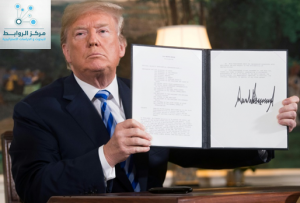Dr.Salim M.Al Zanoon
Trump’s decision to withdraw from the nuclear deal was not surprising, as the indications of the withdrawal began early. This decision puts all the players, specifically the European countries and Iran, in a strategic predicament, difficult choices and creating the international and regional environment for a possible confrontation.
First: The options available to Iran.
The decision to withdraw from the nuclear agreement is aimed primarily at cutting off the economic artery of Tehran and leading it to an economic disaster definitely. It will paralyze the movement of the central bank, prevent the movement of international money transfers, further deterioration of the currency exchange rate and restores sanctions on the oil sector and its consequences of the large deficit in the budget, as well as depriving the strategic metal sector of export or import, and international companies will not be able to invest in Iran.
In this context Iran has three options:
1: adherence to the nuclear agreement.
Iran continues to cooperate and agree with the other signatory parties, and to replace the formula 5 + 1 with a new international framework, group 4 + 1, in an attempt to isolate the United States and maintain the deal, but this is complicated matter given the size of internal political pressures on President Rohani, the rejection of the institutions of the dominant regime, the economic turmoil and the weakness of foreign investment, and the ability of European countries to continue the agreement without the United States.
2: return to nuclear production.
Tehran is convinced that there is no point in staying in the agreement and begins to breach the restrictions on uranium enrichment and reprocessing, in the absence of international monitoring of the United Nations, thereby violating the Nuclear Non-Proliferation Treaty and expelling international inspectors taking in to consideration that any attempt to produce a nuclear weapon would give the pretext for the United States and Israel to launch a broad military action against it.
3: return to negotiation.
The best option for Iran may be to return to the negotiating table to reach an agreement that includes better terms. Given the rigor of the regime’s institutions and the Iranian experience of eluding negotiations with the West, this option may be available in the long term.
Second: Options available to European countries.
The ability of the three European countries is limited to the continuation of the agreement without the United States noting that the American decision to impose sanctions on the countries cooperating with Tehran puts it in the dilemma of choosing between its huge strategic and economic relations with Washington and its limited economic relations with Tehran. In comparison, European companies will choose to be away from Tehran for fear of imposing painful sanctions on them first, and preferring the US market second.
Therefore, the European position, which insists on maintaining the nuclear agreement, will not remain as cohesive unless Iran offers incentives to stay on the same political line, and Europe is not expected to remain in the face of the United States much.
Third: the prospects of military escalation.
The possibilities of confrontation between Israel and Iran, or Saudi Arabia and Iran are at stake.
In recent months, Israeli discourse and practice have seen a state of development and transition from threat to action, accompanied by a departure from ambiguity to the explicit declaration of attacks against Iranian capabilities in Syria.
The American withdrawal from the agreement gives Israel greater audacity to continue its attacks, but these attacks will be limited to attacking Iran’s capabilities in Syria, while seeking to not extend it to other fronts. In contrast, Tehran has no interest in extending the war on two fronts whether the third Lebanon War or the first north war (Lebanon and Syria together), in view of which Syria will be the battlefield between the two parties, which could lead to the outbreak of “Syria’s first war.”
On the other hand, the US withdrawal from the agreement may encourage Riyadh to respond to any provocation from Tehran, but if there is a confrontation between them , it will not be related to the control of the land or regime change in either country, but the conflict will harm the other to punish it and force it to stop the hostile behavior , in this case, the United States will intervene to support Riyadh, and Tehran could raise the costs of the American engagement by targeting its naval forces in the Gulf or using its agents to target US forces in other countries. However, Tehran will have to balance such actions with a risk to attract the United States to enter into a wider war.
In either case, American involvement in the confrontation will be the deciding factor in any potential conflict between Iran and Saudi Arabia or Iran and Israel.
Rawabet Center for Research and Strategic Studies

